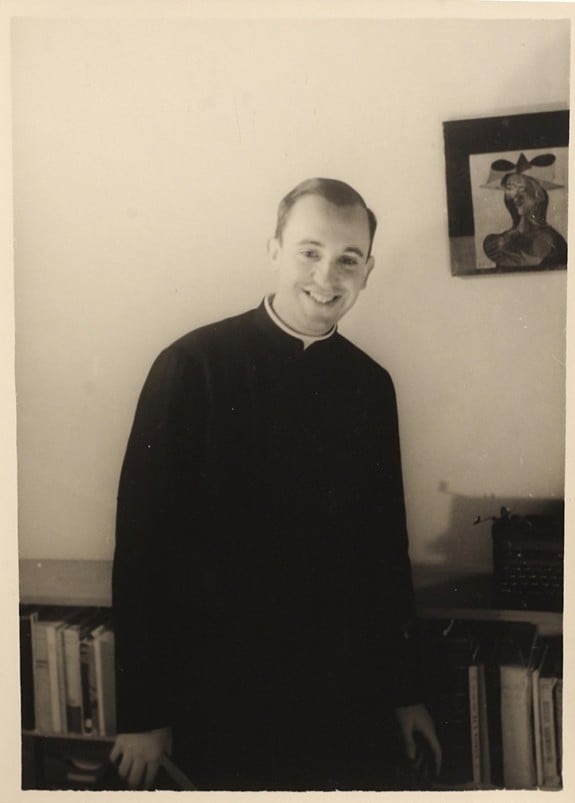A few people have commented on it, and I’ve noticed it, too: the new pope is getting to me. And in a good way.
Something is happening. A man in my parish took communion to a homebound woman a few days ago, and all she could talk about was the new pope. “She told me she was so excited about him, she couldn’t sleep,” he said, amazed. “When was the last time anyone said that about a pope?”
We’re struck by so many small things: that shy little wave on the balcony; the impulsive kiss on the forehead of a man in a wheelchair; the simple seat in the back of the chapel; the plain white cassock and silver cross; those ordinary black shoes that look truly lived in.
But it’s more than his style. It’s things like this:
Forty-nine young people, the inmates of the Roman borstal, Casal del Marmo, are preparing to receive an extraordinary gift.
Pope Francis will go there in the afternoon of Holy Thursday, 28 March, to celebrate the Mass of the Lord’s Supper. A joyful atmosphere of expectation pervades the institute. Such an important visit had certainly not been on the cards. Above all, there had been no expectation of so suddenly touching the heart of the Pope whom they do not yet know. “The young people’s enthusiasm”, Liana Giambartolomei, the principal, told us, “must be linked to the very fact that they feel they will be playing the lead on a historic day. Moreover, this is exactly what Pope Francis wanted. He expressly asked us to make sure that there were no other young people here. He wants to be certain that they know he is coming solely for them, because he loves them, he carries them in his heart and considers them important, very important”. A Caritas worker in the penal institute says that one of them, having heard the news, exclaimed: “At last I shall get to meet someone who says he is my father!”.
Fr Greco, the chaplain, does not conceal the fact that he was somewhat perplexed, at least to start with, “because”, he told our paper, “only eight of our residents are Italian: six boys and two girls. The others are all foreigners. And most of them are Muslim. Then there are some who have no religious belief at all. Therefore many of them don’t even know who the Pope is.
If you’re looking for a clarifying definition of the New Evangelization, look no further. Francis knows. It’s not what we say, it’s what we do—and what we do is done fearlessly, boldly, and from a place of love. It is evangelization that is new because, in fact, it’s old; it relies on a tradition that goes back further than Trent, all the way to Galilee. It brings us back to our roots. See how these Christians love one another.
Which is one reason among many why this new pope is getting to me (and, I gather, so many others). He’s challenging us. Daring us. Nudging us. At the chrism Mass Thursday, he threw down the gauntlet to his priests:
“We need to go out, then, in order to experience our own anointing (as priests) … to the outskirts where there is suffering, bloodshed, blindness that longs for sight, and prisoners in thrall to many evil masters,” he said during a Mass in St. Peter’s Basilica.
The 76-year-old former Cardinal Jorge Bergoglio of Argentina has inherited a Vatican rocked by a scandal in which documents leaked to the media spoke of alleged corruption in its administration and depicted prelates as fighting among themselves to advance their careers.
At the Mass, the start of four days of hectic activities leading up to Easter this Sunday, Francis said priests should not get bogged down in “introspection” but step outside of themselves and concentrate on those who need their help.
“Those who do not go out of themselves, instead of being mediators, gradually become intermediaries, managers. We know the difference: the intermediary, the manager … doesn’t put his own skin and his own heart on the line, he never hears a warm, heartfelt word of thanks,” he said.
“I have given you a model,” Christ said at the last supper, drying the damp feet of his apostles. And here is a man named Francis, actually following that model with a breathtaking simplicity and joy and, yes, love. He’s putting me to shame. If he can do it, why don’t I?
I’m wondering if more people will be asking themselves that question. Perhaps a world that has grown cynical and self-involved will start to see itself differently, and a church that has been polarized by political ideologies and orthodoxies will find common cause.
Could this even signal a new springtime for vocations? Who knows how many young men might see the compassion in his smile, the happy humility of his life, the tenderness toward those who are in pain and say, with envy and longing, “I want to be like that.”
I know the feeling. And I think more people around the world are getting to know it, too.












